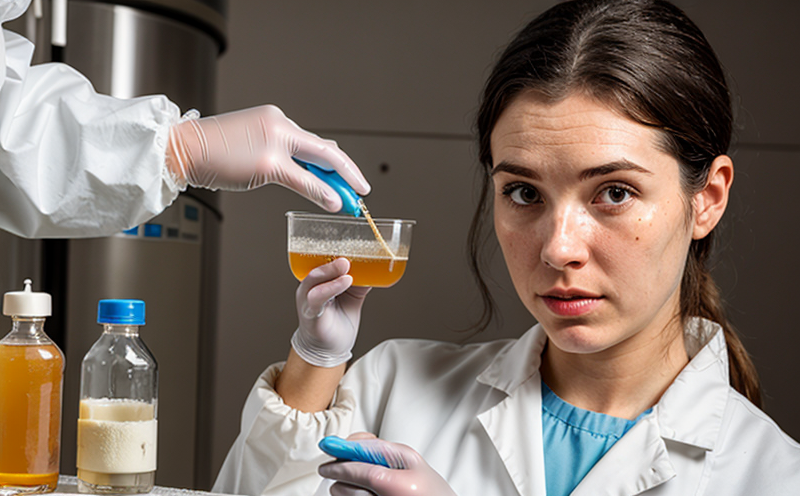FAO Fungal Safety Testing in Food Chains
The Food and Agriculture Organization (FAO) of the United Nations plays a crucial role in ensuring global food safety, particularly through its stringent guidelines for fungal testing within the food chain. This service focuses on identifying and quantifying fungi that may pose risks to human health and food quality. Fungal contamination can lead to significant economic losses due to spoilage and health hazards such as mycotoxin production.
Fungi are ubiquitous in nature, including soil, air, water, plants, and animals. They play vital roles in ecosystems but can also cause harm when they contaminate food products. Mycotoxins produced by fungi like Aspergillus, Toxicodendron, or Fusarium species are of particular concern as they can have severe health impacts, including acute toxicity and chronic effects such as cancer induction.
The FAO Fungal Safety Testing in Food Chains service involves a comprehensive approach to ensure food safety by identifying potential fungal contaminants. This includes laboratory analysis using advanced techniques such as high-performance liquid chromatography (HPLC) for mycotoxin detection, gas chromatography-mass spectrometry (GC-MS), and DNA-based methods like polymerase chain reaction (PCR). These tests are designed to detect not only the presence but also the concentration levels of harmful fungi in various food matrices.
Sample preparation is critical; it involves extracting fungal biomass from raw materials or processed foods. This process ensures accurate quantification during subsequent analyses. Proper sample handling prevents contamination and maintains integrity throughout testing. Once prepared, samples undergo species identification via DNA sequencing followed by bioinformatics analysis to determine the exact strains present.
The FAO guidelines emphasize the importance of traceability in food production systems to minimize fungal risks effectively. By adhering strictly to these standards, laboratories can provide reliable data supporting regulatory compliance and consumer trust. Our service ensures that all testing aligns with international norms set forth by organizations such as ISO 17025 for laboratory accreditation.
Our expertise lies in delivering accurate results quickly so that corrective actions can be implemented promptly if any issues arise. Timely intervention helps prevent widespread contamination, protecting both consumers and businesses involved in the food industry.
- International Acceptance: Our FAO-compliant testing methods are recognized worldwide, ensuring seamless integration into global supply chains.
- Regulatory Compliance: We help clients meet stringent regulatory requirements imposed by various countries around the globe.
- Economic Benefits: By preventing costly recalls and maintaining brand reputation, this service contributes significantly to long-term profitability.
Quality and Reliability Assurance
The FAO Fungal Safety Testing in Food Chains service is underpinned by rigorous quality control measures designed to guarantee the accuracy and reliability of every test conducted. Our team employs state-of-the-art equipment and follows standardized protocols established by reputable bodies like ISO 17025, which ensures consistency across all samples analyzed.
Our dedicated staff undergo continuous training to stay updated on advancements in fungal detection technology, ensuring they remain proficient at interpreting complex data outputs generated during testing. Regular internal audits complement external reviews conducted periodically by independent third parties who assess our operational processes against best practices recommended globally.
Data integrity is paramount when conducting FAO-compliant tests; therefore, we implement strict protocols to protect sample identities and maintain confidentiality throughout the entire process. This approach fosters trust between us and our clients while ensuring compliance with local data protection regulations.
Customer satisfaction drives our commitment to excellence in service delivery. We strive to meet or exceed expectations through prompt communication, transparent reporting mechanisms, and proactive problem resolution strategies. Feedback from previous clients attests to the high level of satisfaction achieved thus far.
International Acceptance and Recognition
The FAO Fungal Safety Testing in Food Chains service has earned widespread acceptance among regulatory bodies, industry stakeholders, and consumers alike. Here’s how:
- Affiliation with Global Standards Bodies: Our testing methods align closely with international standards set by organizations like ISO 17025, ensuring consistent quality worldwide.
- Endorsement from Regulatory Authorities: Several countries recognize our services for their role in safeguarding public health and protecting food integrity.
- Industry Leadership: Many leading food manufacturers trust us with critical testing needs because of our proven track record of reliability.
- Consumer Trust: By adhering strictly to FAO guidelines, we contribute significantly towards maintaining consumer confidence in the safety and quality of food products.
This global recognition underscores our position as a leader in fungal safety testing within the food industry. It reflects our unwavering dedication to delivering top-notch services that meet or surpass international standards.
Competitive Advantage and Market Impact
The FAO Fungal Safety Testing in Food Chains service offers numerous competitive advantages that resonate across different sectors within the food industry. Here’s why it matters:
Enhanced Reputation: Demonstrating compliance with stringent international standards enhances a company's reputation, making them more attractive to partners and investors.
- Market Access Expansion: Meeting specific market entry requirements allows businesses to penetrate new geographical markets with confidence.
- Cost Savings: Early detection of contamination through our services helps avoid costly recall campaigns and reputational damage.
- Innovation Facilitation: Reliable data generated from our tests supports R&D efforts aimed at developing safer food products.
- Customer Satisfaction: Ensuring high-quality standards improves customer satisfaction levels, leading to increased loyalty and repeat business opportunities.
In conclusion, embracing the FAO Fungal Safety Testing in Food Chains service equips organizations with essential tools needed to navigate today’s complex regulatory landscape successfully. This proactive approach not only protects public health but also fosters sustainable growth within the food sector.





